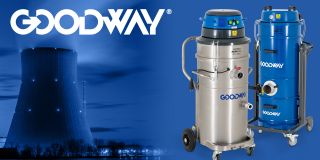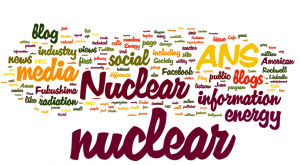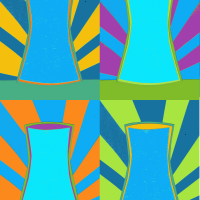ANS welcomes three new student sections
The American Nuclear Society's Board of Directors on June 30 during the ANS Annual Conference in Hollywood, Fla., approved the creation of three new student sections:

A message from Goodway Technologies
Ensuring Safety and Cleanliness: The Crucial Role of Industrial Vacuums in Nuclear Power Facilities
The American Nuclear Society's Board of Directors on June 30 during the ANS Annual Conference in Hollywood, Fla., approved the creation of three new student sections:
In high school one day I learned that nuclear energy is dangerous to people and the environment. After school that day I confronted my dad, a nuclear engineer, and luckily he was attentive enough to know that I am a visual learner and proceeded to "show" me the ways that nuclear is safe. The whole story can be found here, if you haven't already heard it.
Two British environmental writers who were bitterly opposed to nuclear energy development just a few years ago decided to do some homework. Their questioning attitude and fact seeking minds have led them to the inescapable conclusion that most of the arguments against nuclear energy repeatedly offered by the opposition have been pure fabrications. George Monbiot and Mark Lynas both bring assets to the battle for hearts and minds in the energy source debate that are hard to match - they are recent converts to a pro-nuclear technology position with deep credentials in the environmental community. In addition, they are professional communicators with stories to tell.
In new media and old, time must be devoted to finding and conveying accurate information, no matter how short the news cycle.
The history of the development of peaceful uses of nuclear energy is accentuated by a number of significant emotional events. Some have been distinctly positive; the first man-made self-sustaining fission reaction, the first electricity generated by atomic energy, feats accomplished by the first nuclear powered naval vessels, the invention of life-saving nuclear medicine techniques, etc. During and following each of these milestones our collective understanding of the technology has continued to evolve and mature with increased knowledge and experience.
Perhaps one of the more enduring cartoons that relates to the quality of information on the Internet is the one that states, "On the Internet no one knows you are a dog." It shows a drawing of two dogs sitting in front of a computer terminal. Unfortunately, the cartoon is copyrighted material so it can't be reposted here, but you can see it here along with many variations. The point of the cartoon is that words and images on the screen can come from anywhere and anyone. Clearing up misconceptions and outright falsehoods about nuclear energy since the March 11 Fukushima earthquake and tsunami is getting more attention these days. Problems range from not mainstream journalists not understanding the technical issues to people who are publicity crazed fear mongers out to get their face on a video.
Clearing up misconceptions and outright falsehoods about nuclear energy since the March 11 Fukushima earthquake and tsunami is getting more attention these days. Problems range from not mainstream journalists not understanding the technical issues to people who are publicity crazed fear mongers out to get their face on a video.
The use of food irradiation has expanded globally during the past decade and is gaining renewed momentum as a steadily increasing amount of irradiated food enters commercial channels in the United States and worldwide. Although irradiated fruits, vegetables, and poultry have been available commercially since the early 1990s, the introduction of irradiated ground beef by Huisken Meat Company in Minnesota during 2000 significantly increased awareness and interest in the technology.
In the weeks and months following the events at the Fukushima plant in Japan, the American Nuclear Society's Social Media listserv has become a headquarters for sharing information, ideas, and strategies about how to combat misinformation about nuclear energy. This active forum is facilitated by Dan Yurman, who through this effort has opened a new door for collaboration between communicators from all corners of the nuclear community. Many on this list have voiced concerns that the industry response to Fukushima has not yet managed to transition from defensive to offensive, in terms of public outreach.
About 35 percent of current nuclear workers will retire in next five years. Where will the next generation come from?
 Deadlines are approaching for the opportunity to take the 2011 Nuclear Professional Engineer (PE) National Council of Examiners for Engineering and Surveying (NCEES) examination, required by all state registration boards for a PE license. The next administration of the NCEES/ANS Nuclear Engineers exam will be October 28, 2011.
Deadlines are approaching for the opportunity to take the 2011 Nuclear Professional Engineer (PE) National Council of Examiners for Engineering and Surveying (NCEES) examination, required by all state registration boards for a PE license. The next administration of the NCEES/ANS Nuclear Engineers exam will be October 28, 2011.
 Today is the 100th anniversary of the publishing of Ernest Rutherford's revolutionary article, "The Scattering of α and β Particles by Matter and the Structure of the Atom," which appeared in Philosophical Magazine (Series 6 21: 669-688). In the article, Rutherford explained his astonishing and profound discovery that atoms consist of a small and dense nucleus surrounded by electrons.
Today is the 100th anniversary of the publishing of Ernest Rutherford's revolutionary article, "The Scattering of α and β Particles by Matter and the Structure of the Atom," which appeared in Philosophical Magazine (Series 6 21: 669-688). In the article, Rutherford explained his astonishing and profound discovery that atoms consist of a small and dense nucleus surrounded by electrons.
 The basic thesis of a post I wrote in January was that the Chernobyl accident was far enough in the past that the younger generation in the nuclear industry did not have the first-hand memories of the experience, and therefore lacked some of the emotional understanding of the event. I suggested that there should be a conscious effort to pass on how Chernobyl and Three Mile Island affected the culture of the industry.
The basic thesis of a post I wrote in January was that the Chernobyl accident was far enough in the past that the younger generation in the nuclear industry did not have the first-hand memories of the experience, and therefore lacked some of the emotional understanding of the event. I suggested that there should be a conscious effort to pass on how Chernobyl and Three Mile Island affected the culture of the industry.
 It's not as much fun as you might think to stand in front of an auditorium of young people, speaking about energy, and knowing that they simply do not believe you. No, it wasn't that they didn't believe me about nuclear safety-although that may also have been the case-it's that they didn't believe me about the role of renewables. Specifically, they didn't understand the difference between a net-zero energy facility and a zero-use energy facility.
It's not as much fun as you might think to stand in front of an auditorium of young people, speaking about energy, and knowing that they simply do not believe you. No, it wasn't that they didn't believe me about nuclear safety-although that may also have been the case-it's that they didn't believe me about the role of renewables. Specifically, they didn't understand the difference between a net-zero energy facility and a zero-use energy facility.
Time again for another video from the Texas Atomic Film Festival. The video, Money Mobile Goes Nuclear, was the winner at the 2010 festival in the Best Editing category.
For those of us involved in the design of nuclear reactors in the 1970s and 1980s, it was fairly common to walk into somebody's office and see a wall chart depicting the reactor that was being developed or serviced. These were foldout charts that were technically accurate. They were 3D renditions of the reactor, with cutouts showing the internals of the plant, and were made available by the magazine Nuclear Engineering International in the 1950s through the 1990s as inserts in the magazine. Now, several decades later, many of these charts were lost to the publisher due to the multitude of reorganizations and moves that have occurred.
 As an artist I have been lucky to find a place in the nuclear community, but I haven't forgotten what it feels like to be confused about energy (there was a time when I thought that biofuels and solar panels were a viable solution). I want to describe a situation that many young Americans are facing right now, in order to offer perspective on what energy issues look like from the outside. Do your best to put yourself in someone else's shoes for a moment:
As an artist I have been lucky to find a place in the nuclear community, but I haven't forgotten what it feels like to be confused about energy (there was a time when I thought that biofuels and solar panels were a viable solution). I want to describe a situation that many young Americans are facing right now, in order to offer perspective on what energy issues look like from the outside. Do your best to put yourself in someone else's shoes for a moment:
As many of you know, there is a group of 160 or so people that participates in a sort of online party discussion about nuclear. Basically, anyone in the list can send an e-mail that goes to everyone on the list. Anyone can respond and everyone can see it. It works a bit like a huge cocktail party in that you can participate-or not-in any given conversation. This list serves as a sounding board for ideas, information gathering as there are many technical experts in various areas of nuclear energy, and support for those who are out in the larger world communicating about nuclear.
There are many facets of my chosen avocation as a pro-nuclear blogger and podcaster, but one aspect that has been prominent during the 25 days since the Japanese earthquake, tsunami, and nuclear nightmare at Fukushima has been that of atomic educator. Following the role model of my favorite teachers, I have worked hard to maintain a two-way flow of information-successful educators have to be open-minded learners. There is no doubt that I know a lot more about the design and operation of boiling water reactors with MK I containment vessels now than I knew four weeks ago.
Leigh Keever is a professor of sociology at Chattahoochee Technical College, in Marietta, Georgia. Last year, she invited PopAtomic Studios to participate in the service learning program, which has evolved into an ongoing effort to learn about energy issues from a sociological perspective.